What Trump’s win could mean for your wallet – the biggest winners and losers revealed
The stock market, banks and bitcoin all soared on Wednesday after Donald Trump won the presidential election.
Investors rushed to bet on what the 78-year-olds’ return to the White House would mean for the economy and the world.
The losers from his victory include the renewable energy sector and possibly those worried about higher inflation.
The S&P 500 rose 2.5 percent for its best day in nearly two years, while the Dow Jones Industrial Average rose 1,508 points, while the Nasdaq rose 3 percent.
Boost for banks and credit card companies
Goldman Sachs and JPMorgan Chase both rose more than 10 percent, with many expecting Trump to weaken rules on the amount of capital banks must keep in reserve.
Trump takes the stage after the first results of the 2024 US presidential election at the Palm Beach County Convention Center, in West Palm Beach, Florida
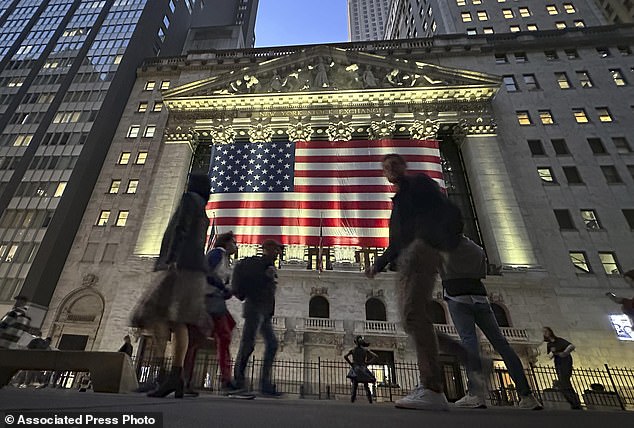
People pass by the New York Stock Exchange in New York’s Financial District on Tuesday, November 5, 2024. Stocks rose Wednesday morning after Trump regained the presidency
President Biden has sought to cap credit card late fees, which could also be eliminated under Trump, who previously talked about a 10 percent cap on rates.
Banks were also helped by government bond yields, which rose to multi-month highs. Higher returns help increase banks’ net interest income.
The biggest gainer of the day was Discover Financial Services, which rose 20 percent.
Capital One Financial also climbed 15 percent, amid speculation about an impending merger between the two that received federal approval under Trump.
Big Tech and Crypto are big winners
The other winners to come out on top included big tech and crypto, with tech leaders hoping for favorable policies under Trump.
Tesla CEO Elon Musk, a well-known Trump supporter who appeared next to him at rallies, saw his company rise by 15 percent.
Chipmaker Nvidia, meanwhile, rose 4.1 percent, just a day after becoming the world’s most valuable company.
Amazon.com also rose 3.8 percent, with founder Jeff Bezos heading to X to congratulate the new president-elect.
He said: “Big congratulations to our 45th and now 47th president on an extraordinary political comeback and decisive victory. No country has greater opportunities.’
Despite gains at technology companies, Meta Platforms, Facebook’s parent company, fell slightly. Trump called Facebook the “enemy of the people.”
In the world of cryptocurrency, assets soared under Trump, who has often spoken about his willingness to embrace the industry. Bitcoin climbed 8 percent to $75,000.
Outside of large-cap companies, the Russell 2000 index of small companies rose 5.8 percent.
The Wall Street Journal reported that such an increase was supported by optimism that corporate tax cuts and lighter regulations for small businesses are on the way.
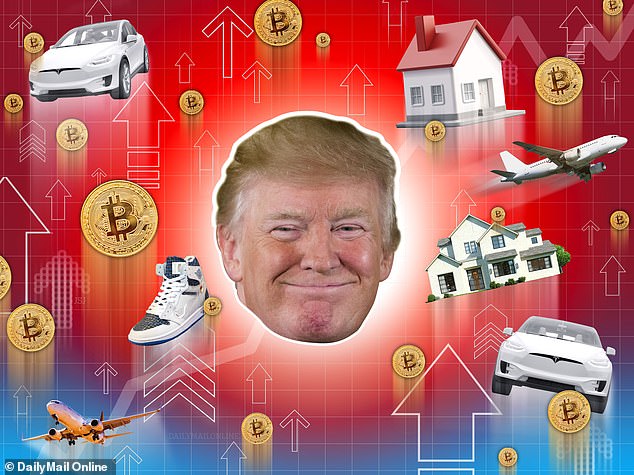
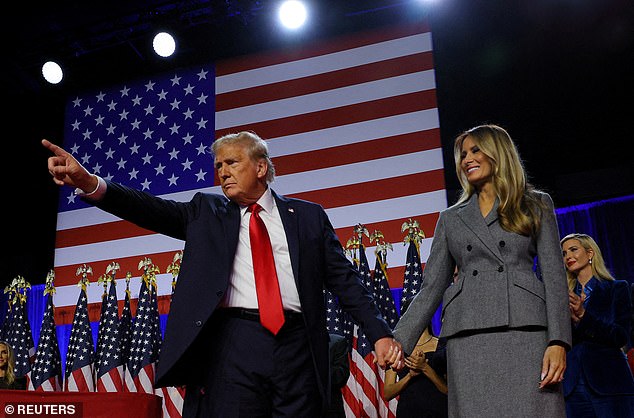
Investors also believe that Trump’s policies and tariff claims are likely to contribute to future inflation
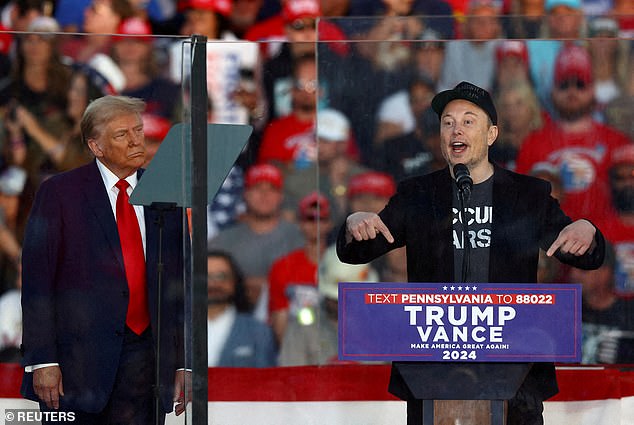
Elon Musk and Donald Trump pictured together at a rally in Butler, Pennsylvania, on October 5
Businesses exposed to tariffs will be hit the hardest
Those that have lost in the markets since Trump won the race include tariff-exposed companies that produce goods abroad.
Shares in Nike, Target, Best Buy and Williams-Sonoma traded lower. All are seen as being highly exposed to tariffs.
Trump has repeatedly talked about his plans to impose tariffs of up to 60 percent on imported goods, especially those coming from China.
He has yet to provide details on how he thinks that idea would work. It is unclear whether he would also drop corporate tax and payroll tax.
The former president had repeatedly denied that average Americans would bear the brunt of the costs of tariffs, arguing that companies abroad would pay them.
David Kelly, chief strategist at JP Morgan Asset Management, told the Wall Street Journal on Wednesday: “We have moved from a period of election uncertainty to significant policy uncertainty.
“But Trump can be very serious about tariffs. He likes tariffs and he sees them as a way to finance tax cuts.”
Inflation concerns are increasing
Investors also believe that Trump’s policies and tariff claims are likely to contribute to future inflation, which could raise the cost of U.S. household bills.
Andrzej Skiba, head of BlueBay US Fixed Income at RBC Global Asset Management, said: “Trump continues to openly tell people that he will raise tariffs not just on China, but on every trading partner.
‘We are talking about tariffs of 10% for all global partners. This is a big problem because it could increase inflation by 1%. If you add 1% to the inflation figures next year, we will have to say goodbye to interest rate cuts.’
A decline in immigration could also lead to a shortage of available workers for employers, which could force companies to increase wages for workers more quickly and put more upward pressure on inflation.
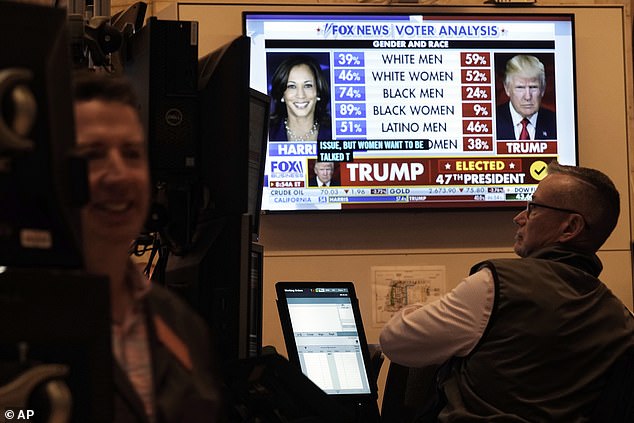
A television screen on the floor of the New York Stock Exchange displays the results of the presidential election
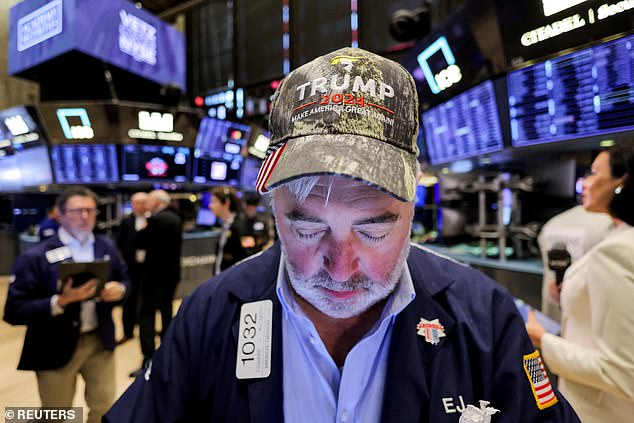
A trader wears a hat in support of Republican Donald Trump, after he won the US presidential election, at the New York Stock Exchange in New York City, USA, November 6, 2024
Democratic presidential candidate Kamala Harris had been light on the details as she discussed her plans for the economy.
Her plan focused on lowering taxes for the middle class, lowering food and grocery costs, and lowering prescription drug prices.
She also talked about creating an “opportunity economy” for Americans to buy their first home or start a business.
Real estate problems due to higher mortgage interest rates
Across the entire S&P 500, real estate was the worst-performing sector, with a loss of 2.6 percent.
Developers rely heavily on debt financing and it appears that financing costs will rise as bond yields rise.
The yield on US government bonds, which influences mortgage rates, rose to 4.425 percent. The highest since early July.
Demand for home builders is expected to decline as a result of higher mortgage interest rates.
Renewable energy stocks are falling
Trump, a known fan of fossil fuels, has actively encouraged the production of oil and natural gas.
His win subsequently sent solar stocks tumbling, including a 10.1% decline for First Solar and a 16.8% decline for Enphase Energy.
The only stock with a bigger loss in the S&P 500 was Super Micro Computer, which said its latest quarter revenue could come in below previous forecasts. The stock fell 18.1%.
The economy proved to be a decisive factor in his return to the White House, with his main promises being tariffs and tax cuts.
Economists and investors agree that tariffs will put upward pressure on inflation, while tax cuts could boost growth and widen deficits.
He did impose tariffs on China during his first term, but has proposed tariffs as high as 60 percent for China and between 10 and 20 percent elsewhere.
Morgan Stanley predicted his plan would raise U.S. consumer prices by 0.9 percent.
Analysts warned that more turbulence is likely to come as results from Congress come in.
A clean slate, in which Trump’s Republicans would gain control of both the Senate and the House of Representatives, would give him a free hand to implement all his plans.
